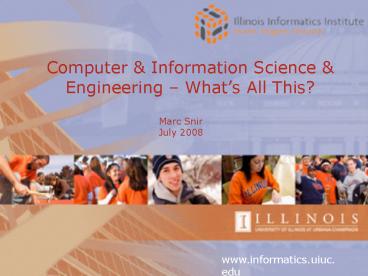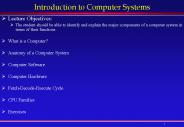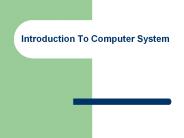Computer - PowerPoint PPT Presentation
Title:
Computer
Description:
Extend our cognitive capabilities: Captures, stores, communicates and analyzes ... Jonathan Quince. 4. Engineering: Building a Better Mousetrap. 5. Mousetrap Science ... – PowerPoint PPT presentation
Number of Views:83
Avg rating:3.0/5.0
Title: Computer
1
Computer Information Science Engineering
Whats All This?
Marc Snir July 2008
2
Computers are Becoming a Necessary Extension of
our Brain
- Extend our cognitive capabilities Captures,
stores, communicates and analyzes massive amounts
of information - Extend our senses Increasingly mediates our
interactions with the physical world and with
other people - Change our perception of the world create new
virtual worlds (simulation games) that enhance
or replace reality abolish distances in time and
space. - Create a new economy of intangibles most
investment is in intangibles IP has become main
means of production you may not believe it,
but world consumes less oil per unit of product. - This is more significant than the industrial
revolution that merely extended our physical
capabilities - And it has just started it will be done when
brain-thought becomes as quaint as hand-made
3
Computing Information Science
EngineeringOrder, Family or Genus?
Engineering
Professional
Science
CE
MIS
CS
SE
IT
IS
LIS
X-Informatics
X astro, bio, business, chem, community, eco,
geo, health, medical, social X art, media,
games
4
Some Views
- Computer Science is no more about computers than
astronomy is about telescopes (Dijkstra) - Computer Science meets every criterion for being
a science, but has a self-inflicted credibility
problem. (Denning) - Any discipline with 'science' in the name isn't.
5
Closer to (Hyper)reality
- Engineering The Science of Building Useful Stuff
Using Science (i.e., applying Applied Science to
applied technology) - Mathematics Physics of Hyperreality
- Computer Science Engineering of Hyperreality
- Computer Engineering Combination of the
Engineering of Hyperreality (architecture,
software, architecture-level hardware) with the
Engineering of Reality (physical-level hardware). - Computer Programming Construction work to
implement Computer Engineering. - Jonathan Quince
6
Engineering Building a Better Mousetrap
Mousetrap Engineering
- Catches more mice
- Cheaper to manufacture
- More robust
- Safer
How
Mousetrap Science
Why
- Physics
- Biology
7
What is Engineering Research?
Alternative View
Pasteur
Medicine, engineering
Edison
Concern with use
Bohr
Quest for fundamentals
8
Engineering A Modern View
Department of Mousetrap Science and Engineering
(MSE)
Mousetrap Science
Mousetrap Engineering
- Physics
- Biology
Foundational sciences Sources of constraints on
mousetrap design
9
Engineering A Modern View
Department of Material Science and Engineering
(MSE)
Material Science
Material Engineering
- Physics
- Biology
10
Information and Computation Engineering
Department of Computer Science
IC Science
IC Engineering
?
11
Information and Computation Engineering
Department of Computer Science is about building
better sw widgets
IC Science
IC Engineering
- Mathematics
- Software, algorithms or protocols are
mathematical artifacts - Time/space complexity are mathematical
abstractions
12
Classical Computer Engineering
Department of Computer Engineering
Computer Science
Computer Engineering
- Mathematics
- Physics
13
Modern Computer Engineering
Department of ??
Computer Science
Computer Engineering
- Mathematics
- Social Sciences
- Psychology, Sociology, Economics, Law
- Constraints come from human in the loop (user,
programmer) - Many constraints are not mathematized
14
Modern Computer Engineering
Department of ??
Constraints
Application Domains
- Mathematics
- Social Sciences
- Sciences
- Humanities
- Arts
- Business
- Products
CS is malleable Affected by apps
15
Computer and Information Science and Engineering
- Engineering of mathematical artifacts that
enhance our cognitive capabilities - Constrained by
- Mathematics
- Constraints of the human in the loop
- Needs of applications
- Quite different from physics driven engineering
- Strong background in social sciences needed for
HCI, social computing, software engineering - Background in application area needed for applied
informatics
16
How Should CISE be Organized, Academically?
- CSECE focus of old CSE Department
- New Computer Information School
- Hard CS mathematized systems (CSE)
- Soft CS human in the loop (CSSocial
Sciences) - May require qualitative science
- IS data organization and retrieval
- Applied informatics impact of applications
17
First Approach
- Natural clusters
18
society
users
interfaces
applications
services
operating systems
networks
M. Pollack
hardware
19
Second Approach Professional Specialization
D. Morello
20
Third Approach Everything Goes
- Georgia Tech 2 (out of 8) threads, one role
- Threads
- Computational modeling, Embodiments, Foundations,
Information Internetworks, Intelligence, Media,
People, Platforms - Roles
- Master practitioners, Entrepreneurs, Innovator,
Communication
21
Organization Principles
- Internal
- Common core CS fundamentals
- A must if we believe we are one discipline
- Secondary split according to
- fundamental sciences needed physics, discrete
math, cognitive science, sociology, economy,
biology - Professional formation computer engineer,
software engineer - Tension between the two organizing principles
- External
- Overall responsibility for teaching/propagating
computational thinking on campus (the paradigm of
computing and information system used to
understand natural or social systems)
22
The Information World
- New flat, flexible, dynamic, reflexive,
intelligent, distributed virtual organizations - Free and open access to information
- Ambiguous relations between agents
competitor/partner, academic/commercial/artistic,
teacher/student/partner - Pull, not push
- Radically Changes the Information Economy
- Except academia
- IT is the main tool for improving the
productivity of services - IT increases productivity when processes are
changed - How should we change the University processes?
23
Informatics at Illinois
- Illinois Informatics Institute
- Takes a broad view of informatics, to encompass
all of CISE - But does not aim to replace or constrain existing
units - Attempts to maintain strong interaction between
research, education and technology services
24
Dimensions
- Intellectual Scope broad definition of
informatics - Culture The boundary breaking Internet culture
- Cultural impact aims at infecting departments
with the Internet culture - Short term research and education scope see next
- Infrastructure virtual organization without
walls, and with no faculty lines (can move fast
and can afford to fail) - Organization participation is voluntary
- Model is unique and distinct from emerging
schools of information will test our ability to
work across boundaries if successful, will have
broader impact
25
Summary
- IT is changing the world
- CISE researchers should be at the forefront of
this change - This is not only (not mainly) an about what we
teach and research, but also about how we teach
and research and how we organize to do so
26
Thank You!































